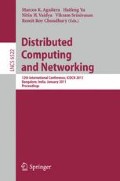Abstract
We address the problem of designing distributed algorithms for large scale networks that are robust to Byzantine faults. We consider a message passing, full information model: the adversary is malicious, controls a constant fraction of processors, and can view all messages in a round before sending out its own messages for that round. Furthermore, each bad processor may send an unlimited number of messages. The only constraint on the adversary is that it must choose its corrupt processors at the start, without knowledge of the processors’ private random bits.
A good quorum is a set of O(logn) processors, which contains a majority of good processors. In this paper, we give a synchronous algorithm which uses polylogarithmic time and \(\tilde{O}(\sqrt{n})\) bits of communication per processor to bring all processors to agreement on a collection of n good quorums, solving Byzantine agreement as well. The collection is balanced in that no processor is in more than O(logn) quorums. This yields the first solution to Byzantine agreement which is both scalable and load-balanced in the full information model.
The technique which involves going from situation where slightly more than 1/2 fraction of processors are good and and agree on a short string with a constant fraction of random bits to a situation where all good processors agree on n good quorums can be done in a fully asynchronous model as well, providing an approach for extending the Byzantine agreement result to this model.
This research was partially supported by NSF CAREER Award 0644058, NSF CCR-0313160, AFOSR MURI grant FA9550-07-1-0532, and NSERC.
Access this chapter
Tax calculation will be finalised at checkout
Purchases are for personal use only
Preview
Unable to display preview. Download preview PDF.
References
Aspnes, J., Shah, G.: Skip graphs. In: SODA, pp. 384–393 (2003)
Attiya, H., Welch, J.: Distributed Computing: Fundamentals, Simulations and Advanced Topics. John Wiley & Sons, Chichester (2004)
Awerbuch, B., Scheideler, C.: Provably secure distributed name service. In: Díaz, J., Karhumäki, J., Lepistö, A., Sannella, D. (eds.) ICALP 2004. LNCS, vol. 3142. Springer, Heidelberg (2004)
Awerbuch, B., Scheideler, C.: Robust distributed name service. In: Voelker, G.M., Shenker, S. (eds.) IPTPS 2004. LNCS, vol. 3279, pp. 237–249. Springer, Heidelberg (2005)
Awerbuch, B., Scheideler, C.: Towards a Scalable and Robust DHT. In: SPAA, pp. 318–327 (2006)
Awerbuch, B., Scheideler, C.: Towards a scalable and robust DHT. Theory Comput. Syst. 45(2), 234–260 (2009)
Dwork, C., Peleg, D., Pippenger, N., Upfal, E.: Fault tolerance in networks of bounded degree. In: STOC, pp. 370–379 (1986)
Fiat, A., Saia, J., Young, M.: Making chord robust to byzantine attacks. In: Brodal, G.S., Leonardi, S. (eds.) ESA 2005. LNCS, vol. 3669, pp. 803–814. Springer, Heidelberg (2005)
Gradwohl, R., Vadhan, S.P., Zuckerman, D.: Random selection with an adversarial majority. In: Dwork, C. (ed.) CRYPTO 2006. LNCS, vol. 4117, pp. 409–426. Springer, Heidelberg (2006)
Kapron, B.M., Kempe, D., King, V., Saia, J., Sanwalani, V.: Fast asynchronous byzantine agreement and leader election with full information. In: SODA, pp. 1038–1047 (2008)
King, V., Saia, J.: From almost everywhere to everywhere: Byzantine agreement with \(\tilde{O}(n^{3/2})\) bits. In: Keidar, I. (ed.) DISC 2009. LNCS, vol. 5805, pp. 464–478. Springer, Heidelberg (2009)
King, V., Saia, J.: Breaking the O(n 2) bit barrier: Scalable byzantine agreement with an adaptive adversary. In: PODC, pp. 420–429 (2010)
King, V., Saia, J., Sanwalani, V., Vee, E.: Scalable leader election. In: SODA, pp. 990–999 (2006)
King, V., Saia, J., Sanwalani, V., Vee, E.: Towards secure and scalable computation in peer-to-peer networks. In: FOCS, pp. 87–98 (2006)
Scheideler, C.: How to Spread Adversarial Nodes? Rotate! In: STOC, pp. 704–713 (2005)
Upfal, E.: Tolerating linear number of faults in networks of bounded degree. In: PODC, pp. 83–89 (1992)
Young, M., Kate, A., Goldberg, I., Karsten, M.: Practical robust communication in DHTs tolerating a byzantine adversary. In: ICDCS, pp. 263–272. IEEE, Los Alamitos (2010)
Zuckerman, D.: Randomness-optimal oblivious sampling. Random Struct. Algorithms 11(4), 345–367 (1997)
Author information
Authors and Affiliations
Editor information
Editors and Affiliations
Rights and permissions
Copyright information
© 2011 Springer-Verlag Berlin Heidelberg
About this paper
Cite this paper
King, V., Lonargan, S., Saia, J., Trehan, A. (2011). Load Balanced Scalable Byzantine Agreement through Quorum Building, with Full Information. In: Aguilera, M.K., Yu, H., Vaidya, N.H., Srinivasan, V., Choudhury, R.R. (eds) Distributed Computing and Networking. ICDCN 2011. Lecture Notes in Computer Science, vol 6522. Springer, Berlin, Heidelberg. https://doi.org/10.1007/978-3-642-17679-1_18
Download citation
DOI: https://doi.org/10.1007/978-3-642-17679-1_18
Publisher Name: Springer, Berlin, Heidelberg
Print ISBN: 978-3-642-17678-4
Online ISBN: 978-3-642-17679-1
eBook Packages: Computer ScienceComputer Science (R0)

